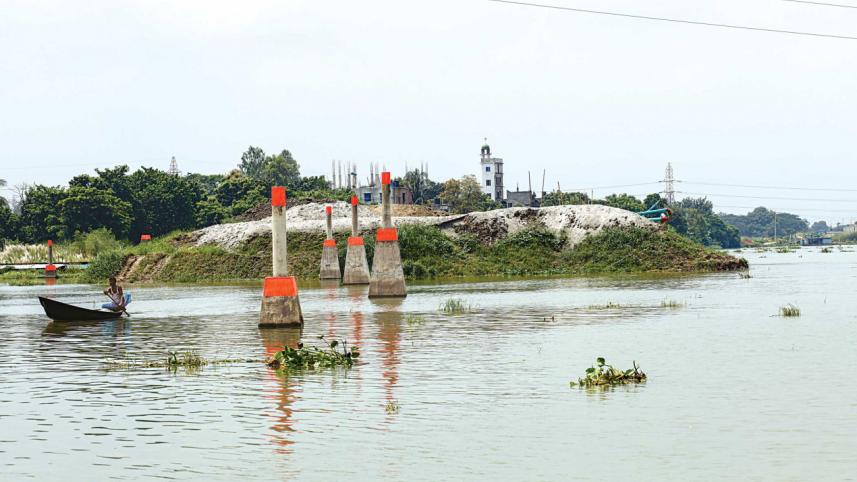Why is BIWTA filling up the Turag again?

The latest initiative of Bangladesh Inland Water Transport Authority (BIWTA) to build permanent structures in Dhaka's Gabtoli, Amin Bazar, and Diabari areas by filling the Turag River is shocking. In 2005, the BIWTA constructed landing stations in the same areas by filling up the riverbanks for a government water taxi service. Despite pouring a huge amount of money into launching the service, the project was an utter failure as the landing stations remained abandoned since the suspension of the service.
The latest plan to construct large concrete jetties on the banks of Turag indicates that the BIWTA has learned nothing from its previous failure. As this daily reported on Monday, multiple private and government structures have also been set up bordering the landing stations by illegally filling the river. According to experts, the construction of these illegal structures violates a High Court directive, as one of the landing stations has been constructed around 150 feet inside the river's boundary demarcation pillars, and the BIWTA has kept filling up the riverbank near the landing station. Moreover, large jetties are being constructed near the landing station's south portion, around 100 feet inside the river's boundary demarcation pillar nos. 210, 211 and 212. Similar construction works were being done near other demarcation pillars as well.
We fail to understand why the BIWTA would choose to ignore an express directive of the High Court imposing a ban on the construction of any structure obstructing the natural water flow of a river. Environmentalists have pointed out that such action may encourage others to also encroach upon the river. And they have also asked whether all this was being done for the interest of any vested quarter, and to legitimise other riverbank grabbers. We believe this is a legitimate question.
In this connection, the comments made by the chairman of the National River Conservation Commission are pertinent. At a recent webinar, he admitted that rivers were becoming "victims of greed" of influential and vested quarters. This newspaper has also, time and again, reported on the continuing river encroachment by influential individuals and groups, and the lack of government action to hold them accountable. This trend must change, and the culture of impunity that is fuelling such illegal activities must be eradicated. But how can that be done, we wonder, when the government bodies themselves are guilty of such encroachment?
We call upon the authorities concerned to immediately look into the matter and ask the BIWTA high-ups to explain why they have taken up this initiative, despite the obvious environmental concerns and a High Court order, risking the life of the Turag River. Additionally, we call on the government to immediately halt said construction work and to clear the riverbank of all such obstructing structures—government or private.



 For all latest news, follow The Daily Star's Google News channel.
For all latest news, follow The Daily Star's Google News channel.
Comments